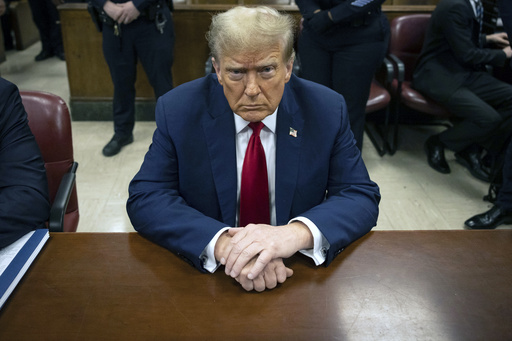
In a surprising twist following his criminal conviction, Donald Trump has managed to turn his legal troubles into a rallying point for his supporters. Items emblazoned with “I’m Voting for the Felon” have emerged, encompassing T-shirts, hats, and lawn signs, highlighting his controversial position. After his conviction in New York on numerous counts of falsifying business records, Trump confidently declared, “The real verdict is going to be Nov. 5 by the people.”
Now, as Trump celebrates a recent electoral victory, a Manhattan judge is set to determine the fate of his conviction concerning hush money payments. Judge Juan M. Merchan plans to release a written opinion soon about whether to dismiss the conviction, taking into account a July U.S. Supreme Court decision that suggests former presidents might have immunity from certain criminal charges.
Originally, Merchan was expected to deliver a ruling in September but delayed the decision to avoid any perception of influencing the election outcomes. This ruling might face further delays if Trump pursues additional legal options to challenge or conclude the case. Should the judge uphold the conviction, a sentencing date is scheduled for November 26, although this timeline may shift due to appeals or other legal actions.
The central issue in Trump’s conviction revolves around efforts to conceal a $130,000 payment made to adult film actress Stormy Daniels, who alleged having an affair with Trump, potentially disrupting his 2016 presidential campaign. Trump has consistently denied this affair and condemned the verdict, claiming it was a politically motivated “witch hunt” designed to undermine his ambitions.
The Supreme Court’s decision emphasized that former presidents cannot be prosecuted for acts carried out as part of their official duties, which complicates the understanding of Trump’s actions surrounding the payment. In this case, while Trump was not yet president when Daniels was paid in 2016, he was in office when his attorney, Michael Cohen, was reimbursed for that payment. Testimony indicated discussions regarding repayment took place in the Oval Office, with jurors concluding that those reimbursements were inaccurately recorded as legal fees in Trump’s business records.
Trump’s legal team contends that the prosecution’s use of certain evidence unfairly influenced the jury, arguing that details regarding Trump’s presidency were incorrectly included in the trial. Prosecutors, however, assert there is no basis for overturning the jury’s decision, insisting that the case pertains to personal conduct that is outside the immunity granted to a sitting president.
The Supreme Court left it to lower courts to clarify what constitutes an official act, leading to ambiguity in the application of its ruling, particularly in state-level matters such as the one concerning Trump. A legal expert noted that establishing a connection between the hush money payment and an official act may be particularly challenging.
Since his election victory, there’s a renewed urgency for Trump to have his conviction overturned, especially with a looming sentencing that could result in fines, probation, or even up to four years in prison. While presidents-elect don’t enjoy the comprehensive legal protections afforded to current presidents, Trump’s unique situation as a former president with aspirations for future office may influence how his legal strategies unfold.
Some analysts speculate that Trump may present the argument that his potential incarceration could pose a crisis for the country, positioning himself as a necessary leader. Legal scholars suggest he will likely seek assistance from every possible legal avenue, potentially prolonging the process.
Moreover, Trump’s legal team continues to push to transfer the case from state to federal court, a move they believe would better support their arguments for immunity. They have filed appeals to overturn a judge’s refusal to grant such a transfer.
If Merchan decides a new trial is warranted, it seems improbable that this could take place while Trump remains in office. Trump’s attorneys have posited that jurors were improperly exposed to evidence during the trial that related to his presidential duties, arguing this should have been excluded.
Furthermore, they challenged the relevance of the prosecution’s use of Trump’s 2018 financial disclosure report, suggesting it unfairly suggested a criminal motive behind his actions. Trump’s representatives maintain that the evidence presented effectively prejudiced the jury against him. However, prosecutors maintain that the challenges raised do not impact the overall validity of the jury’s verdict and merely constitute a small fraction of the substantial evidence presented during the trial.
